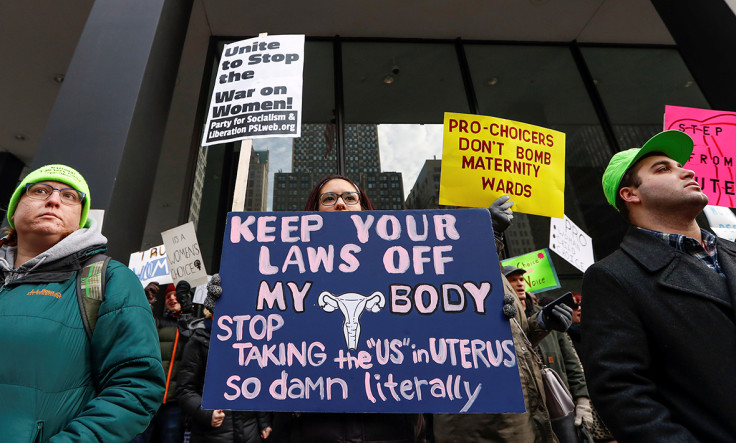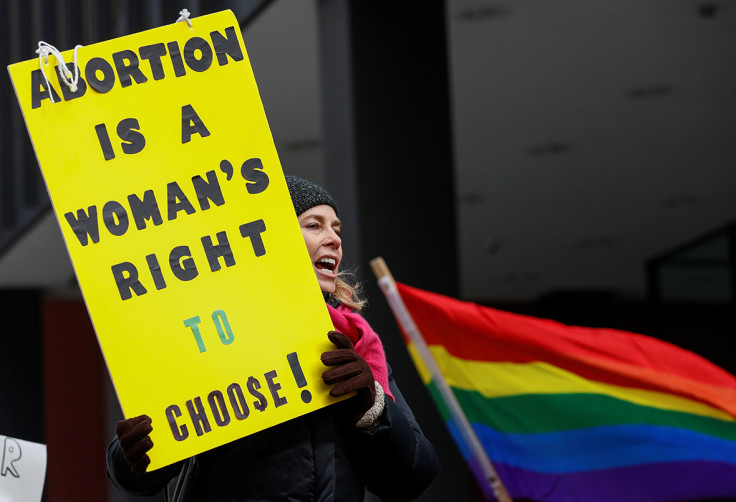Globally 14 pregnant women could die each day as consequence of Trump's abortion-gag order
Unwanted pregnancies, unsafe abortions and maternal deaths will rise as consequence of Mexico City Policy re-enactment.
"We do not seek to impose our way of life on anyone, but rather to let it shine as an example for everyone to follow". These were the words uttered by President Donald Trump during his inauguration speech on Friday (20 January 2017).
Within three days, Trump broke the pledge by re-enacting the Mexico City Policy through executive order, blocking US funding to international non-governmental organisations that provide abortion or family planning services.
The policy, which was first implemented under President Ronald Reagan in 1984, was also dubbed the 'global gag order' as it prevents healthcare workers from discussing the availability of abortion-related services, including counselling or a referral to their patients, even in countries where abortion is legal.
US taxpayers' money is never spent on funding abortion programmes, as this is already banned under the 1973 Helms amendment. The Mexico City policy effectively rules that, to receive US funding, overseas NGOs have to give up offering abortion-related services that they fund through other means.
"In one breath the US is telling my government to promote human rights and good governance. In the other breath it's saying, take away the rights of women to know about all the issues that surround their reproductive health", explained Nkandu Luo, former health minister of Zambia, in a eight-minute documentary about the effect of the gag rule in the country produced by the reproductive health charity PAI.
Every Republican president since Reagan has reinstated the policy within their first few days in office, while every Democrat has repealed it, just as quickly. Anti-abortionist lobbying groups welcomed the news of the policy re-enactment.
"President Trump is continuing Ronald Reagan's legacy by taking immediate action on day one to stop the promotion of abortion through our tax dollars overseas," said Marjorie Dannenfelser of the Susan B. Anthony List. The anti-choice lobby group believes that the policy "ensures that US international aid partners act consistently to save lives, rather than promoting and performing abortion".
As the enactment of the policy affects the organisation's overall funding, it impacts the provision of vital family planning services. "US funds are only ever used for family planning services. This policy fails to recognise that by providing family planning you are actually preventing abortions from happening," said Maaike van Min, strategy and development director at Marie Stopes International, an NGO providing reproductive healthcare in 37 countries and a recipient of USAid.

A robust body of scientific evidence showing that abortions and maternal deaths rise when access to contraceptives and safe abortion is cut. One of the studies, sanctioned by the World Health Organization, found the policy to be associated with increased abortion rates in sub-Saharan African countries. "Our findings suggest that this United States policy may have unrecognised – and unintended – health consequences," the study said.
The American Congress of Obstetricians and Gynecologists also believes the policy's restrictions "violate basic medical ethics by jeopardising a healthcare provider's ability to recommend appropriate medical care".
MSI's work in providing family planning and access to abortion-related services prevented 6.3 million unintended pregnancies, four million unsafe abortions and 18,100 maternal deaths in 2015. The organisation said that in the five years since 2010, the number of women we are protecting from unplanned pregnancy annually more than doubled.
The organisation will now have to face a significant shortage in funding as it refuses to comply to the gag rule. "We know that access to safe abortions is absolutely critical to women's welfare. We cannot agree to its conditions," van Min explained. She worries about the impact that the policy would have on the well-being of the women in the countries MSI operates in: "We reach 1.5 million women a year with USAid funding, if we don't find alternative sources of funding those women may have to go without very necessary family planning service."
According to the organisation's estimates, in the next four years the policy re-enactment would lead to 6.5 million unintended pregnancies, 2.2 million abortions, of which 99% unsafe, and a staggering 21,700 maternal deaths – in other words, 14 pregnant women a day.

The charity PAI collected examples of the effect of the Mexico City policy re-enactment under George W Bush's administration. In 2003, the Planned Parenthood Association of Ghana (PPAG), the country's oldest and largest provider of reproductive health services, lost $200,000 in USAid funding. To cope with the loss of funding, 67 key staff members had to be fired, the nursing staff was reduced by 44%, leading to a 40% fall in family planning use by those served by the organisation. More than 1,327 communities in Ghana were affected by the cuts.
Similarly, MSI Kenya lost its funding in 2001. They year later, it had to close two clinics and the organisation was only able to keep further clinics from closing by laying off staff. The Family Planning Association of Kenya also refused to comply to the global gag rule but, unable to replace the lost USAid money, it closed 15 clinics between 2001 and 2005.
In Nepal, the country's Family Planning Association lost $400,000 in USAid-funded contraceptives, two-thirds of its total stock, thus reducing the number of women they could serve. The Family Guidance Association of Ethiopia (FGAE), which also rejected the policy, faced shortages of condoms and popular contraceptive methods.
"There is always a story behind every number" van Min said, recalling an encounter with a 38-year-old woman in Senegal, who begged for help in preventing any further pregnancies so that she could focus on providing for her living children. "I can think of thousands of women in this situation. They have no influence over who gets elected in the US, but these people have so much influence on the women's lives and it feel wrong. It's a personal tragedy for a lot of women."
© Copyright IBTimes 2025. All rights reserved.






















